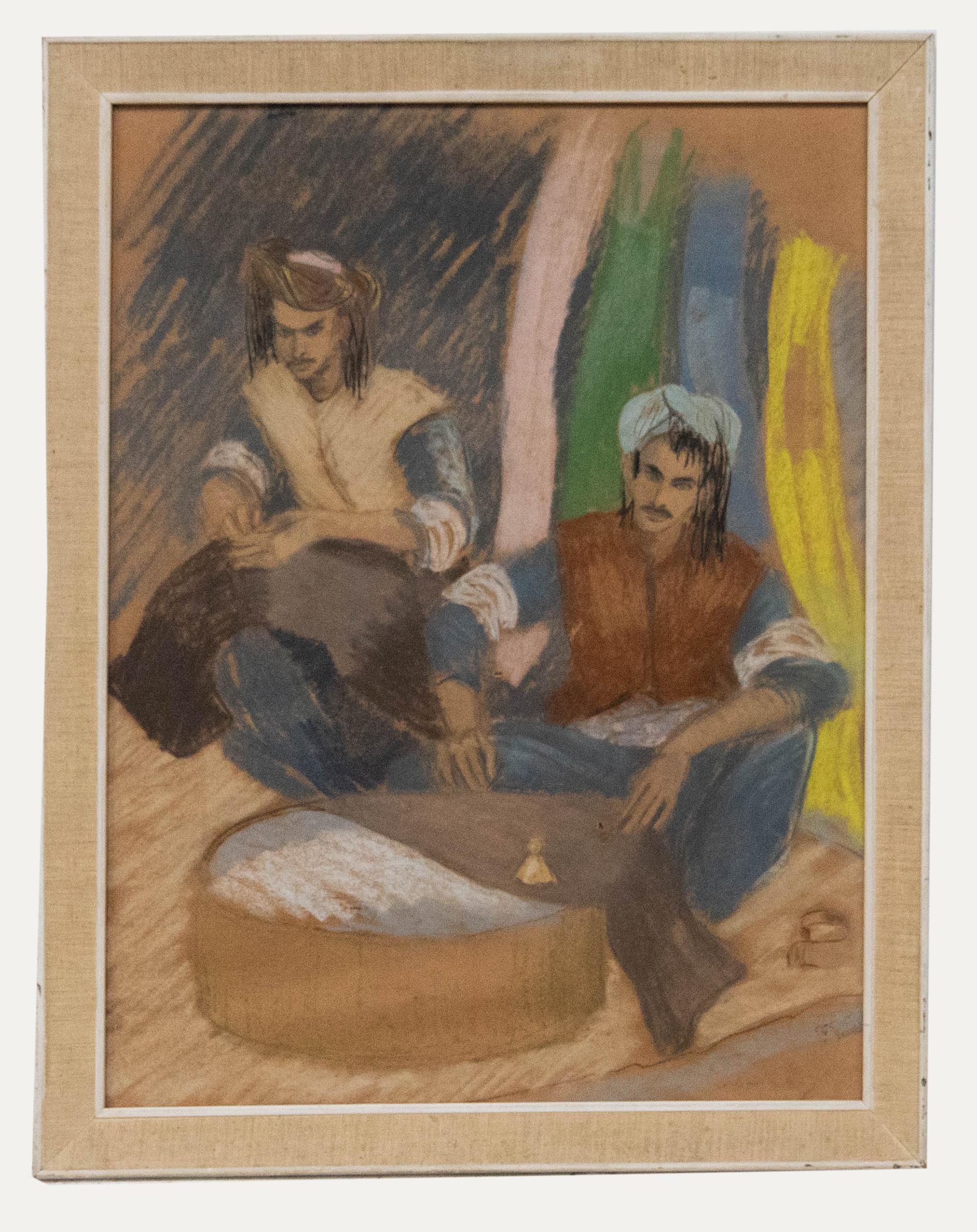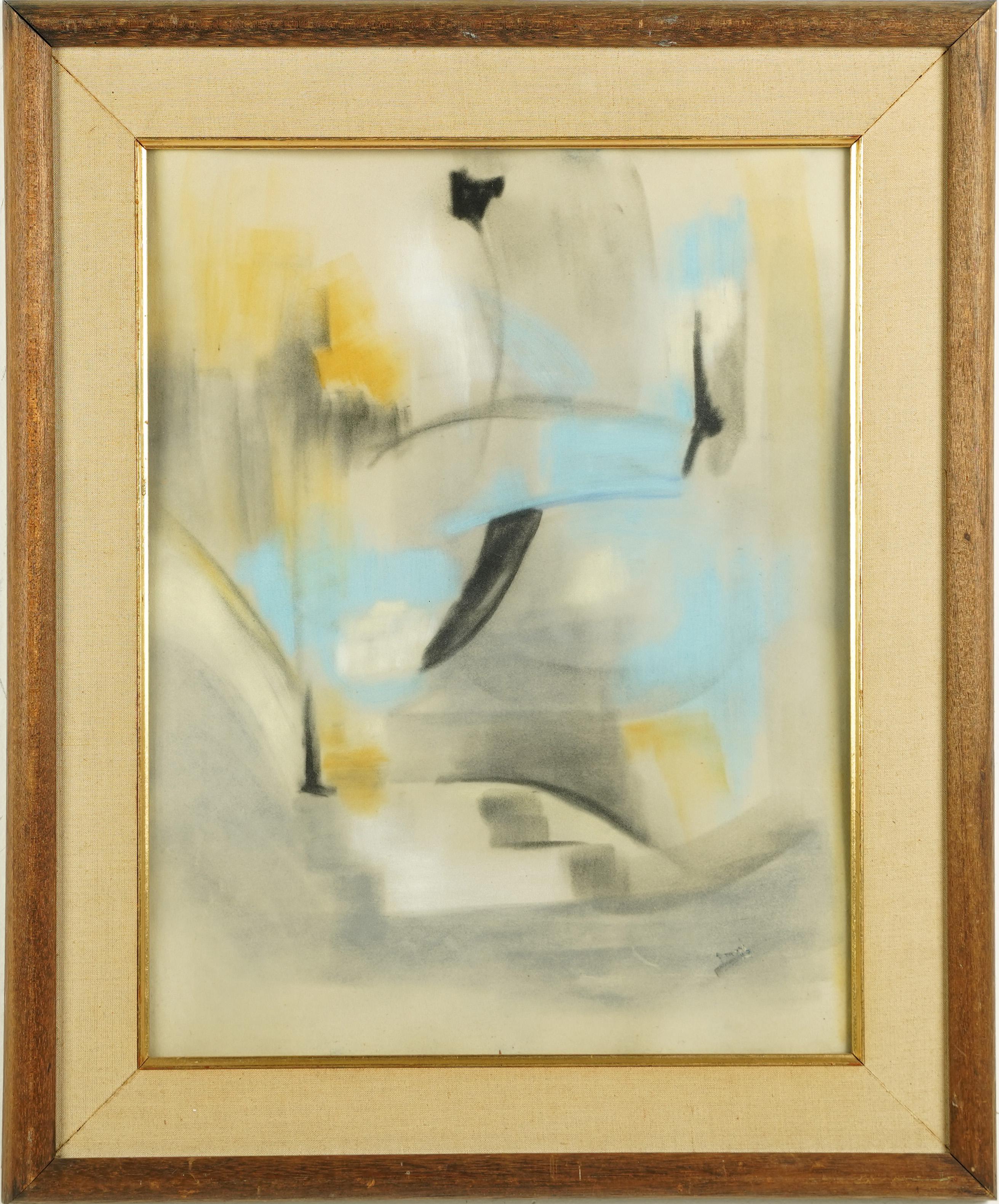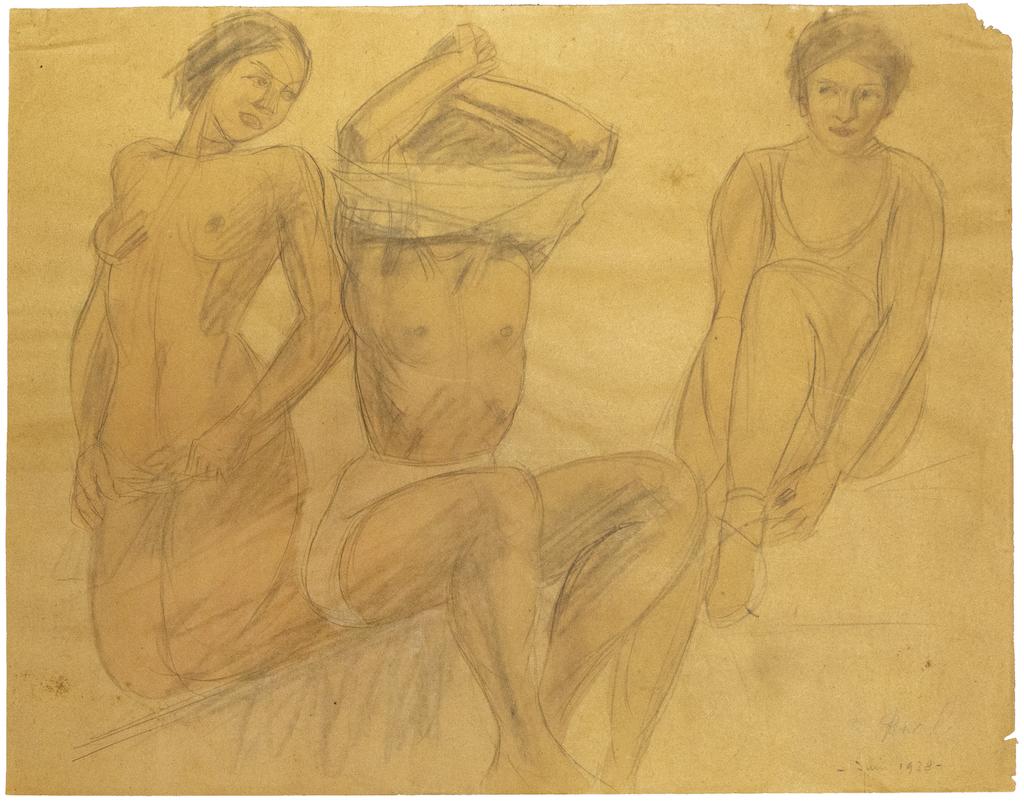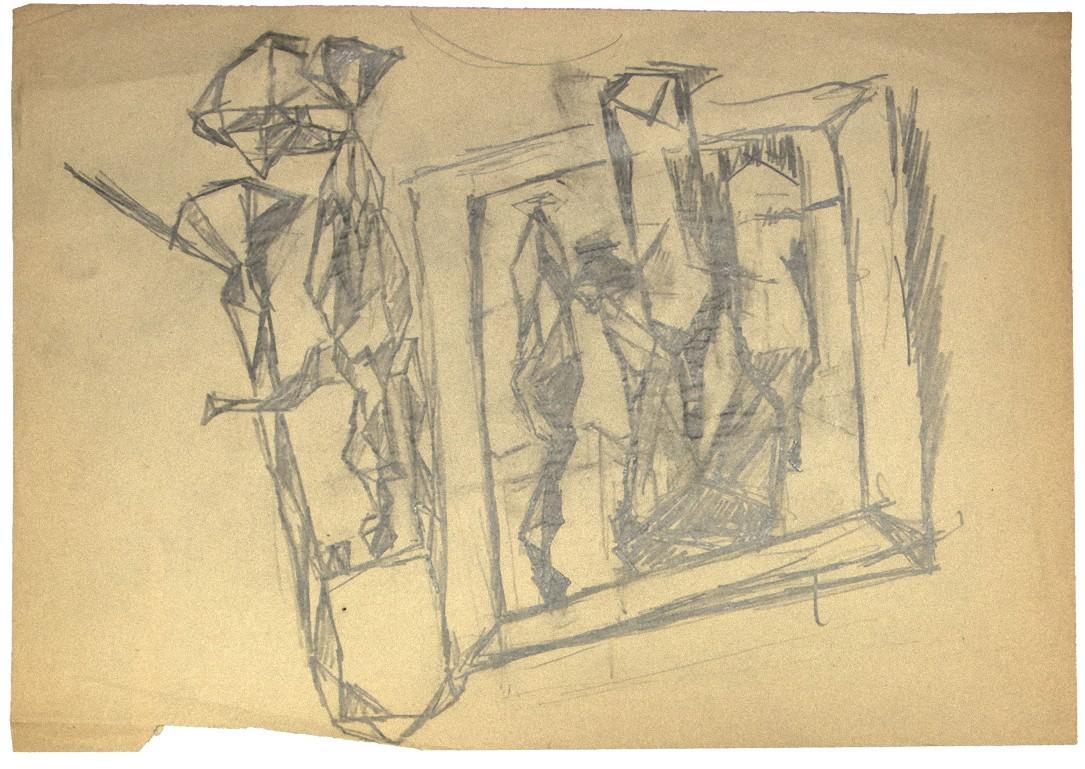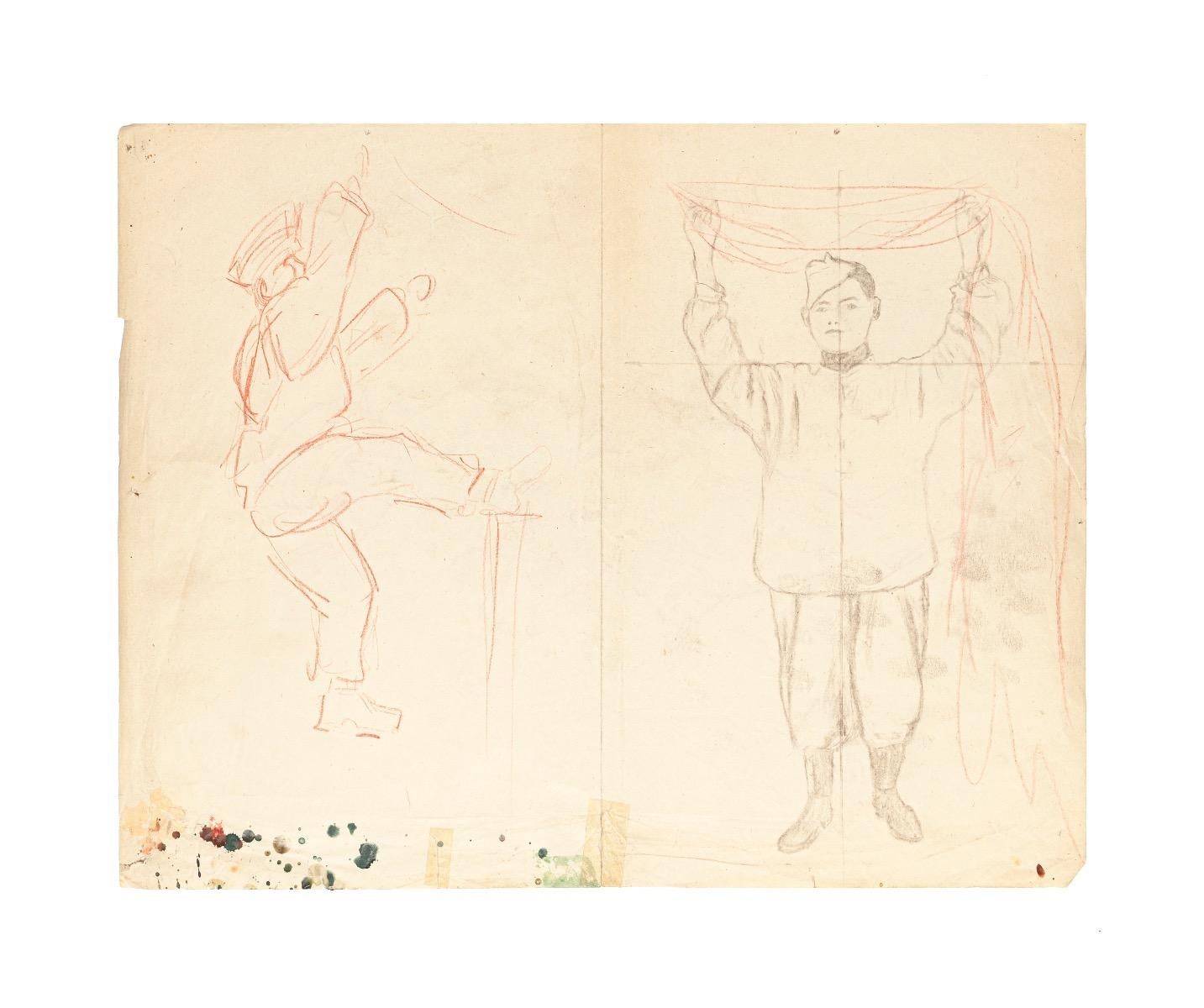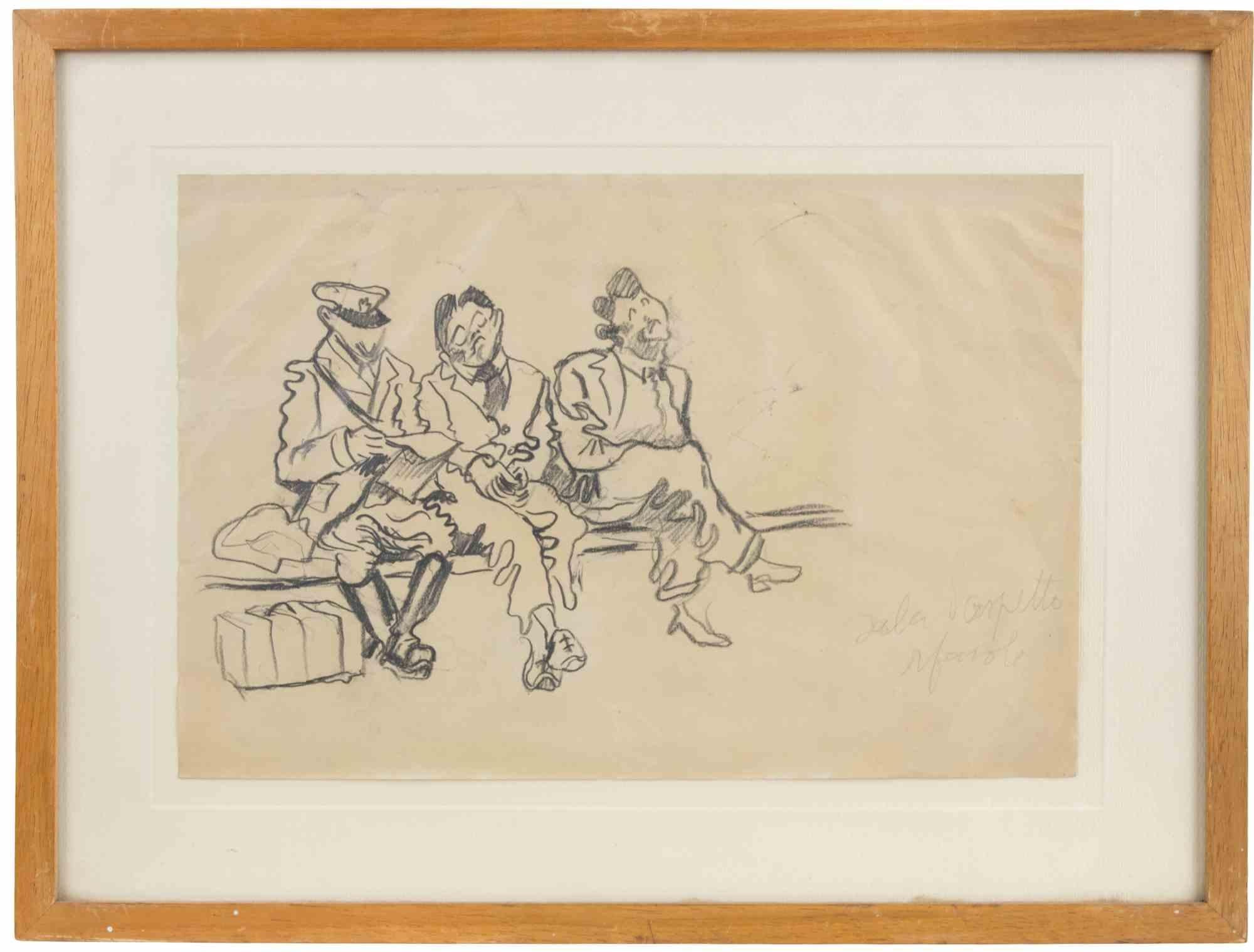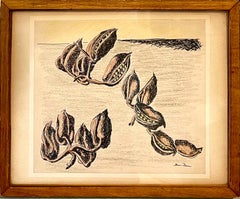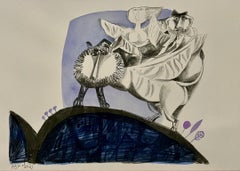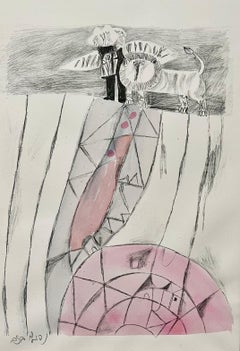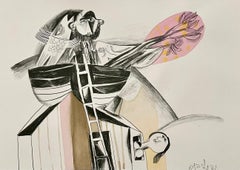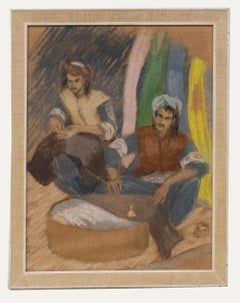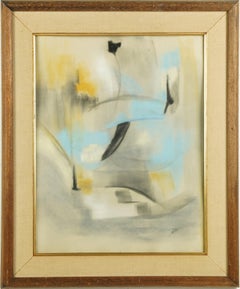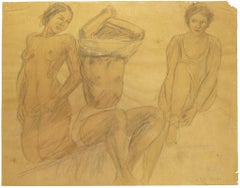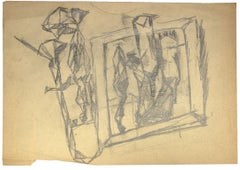Items Similar to Rare Early Israeli Cubist Pencil Pastel Drawing Arieh Leo Lubin 1930's Palestine
Want more images or videos?
Request additional images or videos from the seller
1 of 11
Arieh LubinRare Early Israeli Cubist Pencil Pastel Drawing Arieh Leo Lubin 1930's Palestinec.1930's-1940's
c.1930's-1940's
$700
£529.11
€608.05
CA$974.75
A$1,084.36
CHF 568.44
MX$13,250.67
NOK 7,238.34
SEK 6,813.90
DKK 4,538.83
Shipping
Retrieving quote...The 1stDibs Promise:
Authenticity Guarantee,
Money-Back Guarantee,
24-Hour Cancellation
About the Item
Arieh (Leo) Lubin, Israeli, 1897-1980
Drawing in pencil and pastel of two seated Arab or Sephardic Jewish figures.
Hand signed in Hebrew upper left.
Dimensions: (Frame) H 18" x W 22.5", (Sight) H 8" x W 13.
Condition: Paper is clean and slightly wavy, age toning to mat.
Arieh Lubin (Hebrew: אריה לובין; 1897–1980) was an American born Israeli artist.
born in the United States Arieh Lubin was born in Chicago to a family of Zionist immigrants from Russia. In 1913, he was sent by his family to Palestine, where he studied at Gymnasia Herzliya. When World War I broke out, he returned to the United States and began to study at the Art Institute of Chicago in 1915. He left to join the Jewish Brigade in World War I. After the war, he studied in Europe and returned to Israel in 1922.
Lubin's work reflects contemporary trends of the 1920s. His main influences were Paul Cézanne, Pablo Picasso, and Henri Matisse. He absorbed the Cubist influence of Andre Derain and the Purism of Le Corbusier and Amedee Ozenfant by reading "L'Esprit Nouveau", a journal he ordered from Paris. Lubin was one of the first Israeli artists to settle in the artists quarter of Safed, Israel. In a country virtually isolated form the centers of culture and information, the striving of the Eretz Israel artists of the 1920s to draw on international sources was unique. He was one of the first Israeli artists to settle in the artist’s quarter of Safed. Aryeh belonged to the first school of "Israeli" art that sprang up in the twenties (together with Reuven Rubin, Nahum Gutman, Yosef Zaritzky, Menachem Shemi, Chaim Gliksberg and others) whose members rebelled against the teachers of Bezalel in Jerusalem and made Tel Aviv the artistic center of Israel. In the twenties, many of these artists showed a tendency towards cubism and primitivism: they chose local eastern scenes as the subjects of their works and demonstrated an original "Hebrew" enthusiasm in their approach to the local scene and its inhabitants.
Part of the early generation of artists in Israel, Joseph Zaritsky, Arieh Lubin, Reuven Rubin, Sionah Tagger, Pinchas Litvinovsky, Mordecai Ardon, Yitzhak Katz, and Baruch Agadati; These painters depicted the country’s landscapes in the 1920s rebelled against the Bezalel school of Boris Schatz. During his artistic career Lubin won many prizes including the John Quincy Adams Prize for Study Abroad in 1922, the Ramat Gan Panorama Prize in 1956, the Olympic Committee Prize for Sports Subjects in 1957 and the Dizengoff Prize for Painting also in 1957. He had two one-man shows at the Tel Aviv Museum (1947 and 1968) and also participated at the Venice Biennale three times in the years 1948, 1950 and 1960 and twice at the Sao Paolo Biennale in 1953 and 1958. In 1978 Lubin was named an Honorary Citizen of the city of Tel Aviv. Lubin died in Tel Aviv in 1980. He is buried in Trumpeldor Cemetery.
General Exhibition Art Gallery of the ''Habima'' Building, Tel Aviv 1943
with artists: Castel, Moshe Frenkel, Itzhak Janco, Marcel Hendler, David Streichman, Yehezkel Okashi, Avshalom Atar (Aptekar), Chaim Giladi, Aharon Shemi, Menahem Stematsky, Avigdor Lubin, Arieh (Leo)
General Exhibition
Art Gallery of the ''Habima'' Building, Tel Aviv, 1941
Artists: Shemi, Menahem Frenkel, Itzhak Castel, Moshe Atar (Aptekar), Chaim Litvinovsky, Pinchas Stematsky, Avigdor Streichman, Yehezkel Levanon, Mordechai Kossonogi, Joseph Naton, Abraham Shorr, Zvi Hendler, David Lubin, Arieh (Leo) Paldi, Israel Gliksberg, Haim Zaritsky, Yossef Baser, Robert Ziffer, Moshe Sternschuss, Moses Priver, Aaron Giladi, Aharon Krize, Yehiel Feigin, Dov Awards and recognition
1922 John Quincy Adams Prize for Study Abroad
1956 Ramat Gan Panorama Prize
1957 Olympic Committee Prize for Sports Subjects
1957 Dizengoff Prize
1978 Worthy of Tel Aviv
- Creator:Arieh Lubin (1897 - 1980, American, Israeli)
- Creation Year:c.1930's-1940's
- Dimensions:Height: 18 in (45.72 cm)Width: 22.5 in (57.15 cm)
- Medium:
- Period:
- Condition:minor wear to frame and mat commensurate with age, please see photos.
- Gallery Location:Surfside, FL
- Reference Number:1stDibs: LU38216465562
About the Seller
4.9
Platinum Seller
Premium sellers with a 4.7+ rating and 24-hour response times
Established in 1995
1stDibs seller since 2014
1,782 sales on 1stDibs
Typical response time: <1 hour
- ShippingRetrieving quote...Shipping from: Miami, FL
- Return Policy
Authenticity Guarantee
In the unlikely event there’s an issue with an item’s authenticity, contact us within 1 year for a full refund. DetailsMoney-Back Guarantee
If your item is not as described, is damaged in transit, or does not arrive, contact us within 7 days for a full refund. Details24-Hour Cancellation
You have a 24-hour grace period in which to reconsider your purchase, with no questions asked.Vetted Professional Sellers
Our world-class sellers must adhere to strict standards for service and quality, maintaining the integrity of our listings.Price-Match Guarantee
If you find that a seller listed the same item for a lower price elsewhere, we’ll match it.Trusted Global Delivery
Our best-in-class carrier network provides specialized shipping options worldwide, including custom delivery.More From This Seller
View AllExpressionist Ink, Pastel, Crayon Drawing Jewish American Modernist Ben Zion WPA
By Ben-Zion Weinman
Located in Surfside, FL
Expressionist ink and pastel crayon drawing of beans (carobs, flowers?) in pods
Hand signed.
Born in 1897, Ben-Zion Weinman celebrated his European Jewish heritage in his visual wo...
Category
Mid-20th Century Expressionist Still-life Drawings and Watercolors
Materials
Paper, Oil Crayon, Pastel, Ink
Rare Israeli Modernist Judaica Watercolor Painting on Lithograph Naftali Bezem
By Naftali Bezem
Located in Surfside, FL
Naftali Bezem (Hebrew: נפתלי בזם; born November 27, 1924) is an Israeli painter, muralist, and sculptor.
Bezem was born in Essen, Germany, in 1924. His early adolescence was spent ...
Category
20th Century Modern Figurative Drawings and Watercolors
Materials
Watercolor, Lithograph
Rare Israeli Modernist Judaica Watercolor Painting on Lithograph Naftali Bezem
By Naftali Bezem
Located in Surfside, FL
Naftali Bezem (Hebrew: נפתלי בזם; born November 27, 1924) is an Israeli painter, muralist, and sculptor.
Bezem was born in Essen, Germany, in 1924. His early adolescence was spent ...
Category
20th Century Modern Figurative Drawings and Watercolors
Materials
Watercolor, Lithograph
Rare Israeli Modernist Judaica Watercolor Painting on Lithograph Naftali Bezem
By Naftali Bezem
Located in Surfside, FL
Naftali Bezem (Hebrew: נפתלי בזם; born November 27, 1924) is an Israeli painter, muralist, and sculptor.
Bezem was born in Essen, Germany, in 1924. His early adolescence was spent ...
Category
1970s Modern Figurative Drawings and Watercolors
Materials
Watercolor, Lithograph
Rare Israeli Modernist Judaica Watercolor Painting on Lithograph Naftali Bezem
By Naftali Bezem
Located in Surfside, FL
Naftali Bezem (Hebrew: נפתלי בזם; born November 27, 1924) is an Israeli painter, muralist, and sculptor.
Bezem was born in Essen, Germany, in 1924. His early adolescence was spent ...
Category
20th Century Modern Figurative Drawings and Watercolors
Materials
Watercolor, Lithograph
Rare Israeli Judaica Watercolor Painting Over Print Bezem
By Naftali Bezem
Located in Surfside, FL
Naftali Bezem (Hebrew: נפתלי בזם; born November 27, 1924) is an Israeli painter, muralist, and sculptor.
Bezem was born in Essen, Germany, in 1924. His early adolescence was spent under Nazi oppression, in constant fear for the safety of his parents, who perished in the Holocaust in the Polish Auschwitz concentration camp. Naftali emigrated to Mandate Palestine in 1939, at the age of fourteen with a Youth Aliyah group.
From 1943 to 1946, he studied art at the Bezalel Academy of Art and Design in Jerusalem with Israeli painter Mordecai Ardon...
Category
20th Century Modern Figurative Paintings
Materials
Ink, Watercolor
You May Also Like
Sue Southby - Framed Mid 20th Century Pastel, Kurdish Tailors
Located in Corsham, GB
Sue Southby- original work in pastel. Kurdish Tailors, Rowanduz area, Kurdistan, Iraq. Indistinctly signed to the lower right. Presented in a white frame with linen border. Labelled ...
Category
20th Century Portrait Drawings and Watercolors
Materials
Pastel
$288 Sale Price
20% Off
Antique American School Cubist Abstract Signed Framed Pastel Painting
Located in Buffalo, NY
Antique American modernist abstract pastel and watercolor painting. Signed illegibly. Framed. Image size, 14L x 18H.
Category
1930s Abstract Landscape Paintings
Materials
Canvas, Oil
$796 Sale Price
20% Off
Figures - Original Pencil and Oil Pastel on Paper by O. Roche - 1938
Located in Roma, IT
Figures is an original modern drawing in pencil and pastels on paper realized by O.Roche in 1938
Sheet dimension: 25 x 32
good conditions except for a cutaway at the top margin tha...
Category
1930s Modern Figurative Drawings and Watercolors
Materials
Pencil, Oil Pastel
Figures - Pencil Drawing by Leon Aubert - Early 20th Century
Located in Roma, IT
Figures is a modern drawing in pencil on paper realized by Leon Aubert (1824-1906)
Sheet dimension: 24.5 x 34.5
Good conditions except for a cutaway at the lower margin that doesn'...
Category
Early 20th Century Modern Figurative Drawings and Watercolors
Materials
Pencil
Figures - Original Pencil and Pastel Drawing - Early 20th Century
Located in Roma, IT
Dancing Figure is an original drawing in pencil and pastel on paper realized by an artist of the Early 20th century. With the drawing of a dancing boy on the rear.
The state of pres...
Category
Early 20th Century Figurative Drawings and Watercolors
Materials
Pencil, Pastel
Figures - Drawing by Fausto Pirandello - Mid-20th Century
By Fausto Pirandello
Located in Roma, IT
Figures is a pencil drawing realized in the Mid-20th Century by Fausto Pirandello.
Pencil on paper.
Good conditions with slight foxing.
The artwork is realized through deft expres...
Category
Mid-20th Century Modern Figurative Drawings and Watercolors
Materials
Pencil
